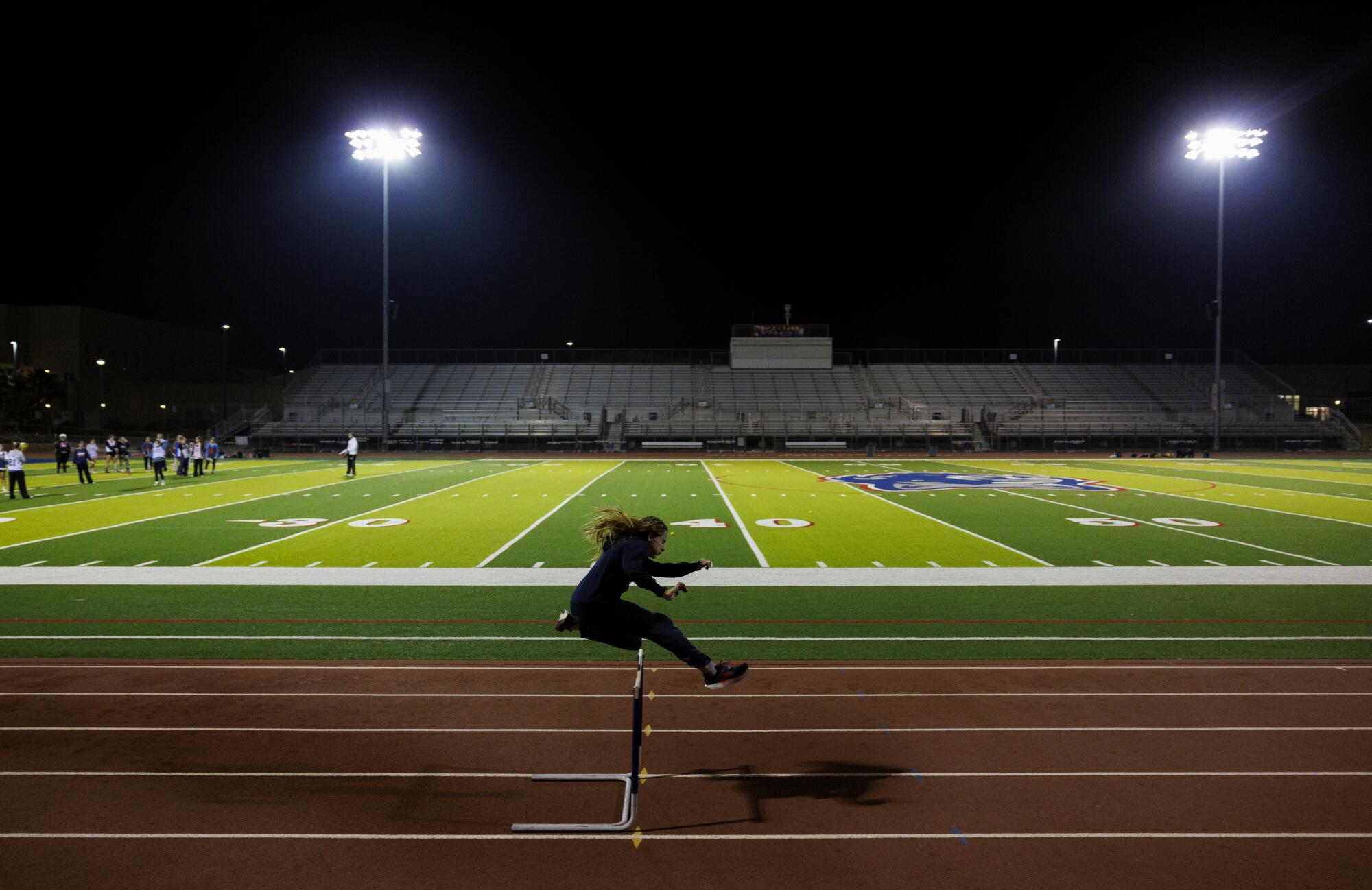
- Share via
- M.L. and S.M., 16 and 17, watched as their competing in girls sports sparked a raucous debate at their Riverside high school.
- The battle, echoed nationally this week, has made them feel targeted, they said. One has dropped her sport, the other is pushing on.
- As the Trump administration moves to diminish trans rights further, their worried families beg people to remember, “These are kids.”
When M.L. walks the halls of her Riverside high school, the fact that her life is the subject of a swirling national debate is never far from mind. It’s spelled out on the T-shirts of kids all around her.
“SAVE GIRLS SPORTS,” read some. “WE’RE ALL EQUAL,” read others.
The dueling shirts provide a stark visual of what her schoolmates think about her competing on the girls’ cross-country and track teams. It’s made her feel both proud and anxious, she said — and a bit like being in a fishbowl.

“A lot of people have said things, both good and bad,” said M.L., who is 16 and transgender. She asked to be identified only by initials because of the threats young athletes like her have faced nationwide. “It’s nerve-racking.”
Individual school hallways, sports fields and tracks like those at Martin Luther King High School in Riverside, which M.L. attends, are the real front lines in the nation’s contentious battle over transgender athletes.
More than the White House, where President Trump issued an executive order Wednesday purporting to ban transgender girls from sports. Or the legislative halls of Washington or Sacramento, where bills propose similar bans. Or the Riverside Unified School Board, which heard its latest round of debate on the matter Thursday.
As controversy brews over the rights of transgender athletes, some are calling on the Riverside Unified School District to defy California’s anti-discrimination laws.
School is where the humanity of trans kids is most apparent, where their earnestness and fear are most palpable and where the sweeping pronouncements of people such as Trump about the supposed threat they pose can seem most alarmist and reductive.
“They’re attacking real kids and real families,” M.L.’s mother said. “Our kids are just trying to be themselves, and if anything, they’re the ones that should be afraid of all the hate.”
M.L. said she has felt buoyed by the support she’s received from her school administrators — for which the school is being sued — and from many of her classmates. But she said it also feels as if the Trump administration is “putting a massive, unnecessary target” on the backs of kids like her, in part by suggesting it is “common sense” to conclude transgender kids simply don’t exist or that their only motivation for playing sports is to dominate their cisgender classmates.

“I don’t think that anyone would put themselves through what we have to go through just to win,” she said.
S.M., a 17-year-old transgender classmate who also requested to go by initials, agreed.
She had been excited to compete her senior year in pole vaulting, she said, but it all became too much amid Trump’s antagonism and the recent flood of attention her school has received from anti-transgender activists from across the country.
Being in the thick of the debate felt so much like being underwater — suffocating and scary — that she quit King’s track and field team.
“It was like you couldn’t breathe,” she said.
Controversy hits home
M.L. — an avid runner, experienced chess player and video game aficionado — is 5 feet 4 and slight, about 120 pounds. She has long, light hair, a ready smile, and is set to graduate early, with plans to study quantum physics and astrophysics in college.

She speaks in sophisticated sentences that seem beyond her years and comes across in conversation as utterly guileless — but clearly determined.
“That’s kind of been her vibe her entire life,” her mother said. “She’s always been really tiny, she’s always been super genius.”
She also has a speech impairment that causes her to mispronounce certain words, “so she’s always been different,” her mother said. “But she’s never really dwelled on that.”
After transferring to King from another Riverside school last year, M.L. joined the girls’ cross-country team. In October, she was added to a select varsity squad and chosen to run for the school at the Mt. SAC Cross Country Invitational, including in the prominent meet’s team sweepstakes race.
As controversy brews over the rights of transgender athletes, some are calling on the Riverside Unified School District to defy California’s anti-discrimination laws.
That did not sit well with some of her teammates, including a girl who was bumped from competing in the sweepstakes after posting a slower time than M.L.’s. That girl’s parents protested, and her mother filed a Title IX complaint alleging that her daughter was being illegally discriminated against.
At the Oct. 26 invitational, the bumped girl, two other girls and more than a dozen parents and grandparents wore the “SAVE GIRLS SPORTS” shirts. On the back the shirts read, “IT’S COMMON SENSE. XX [does not equal] XY,” a reference to the different chromosome pairings of biological females and males.

The following week, the bumped girl and a junior varsity athlete wore the shirts to practice, prompting King athletic director and assistant principal Amanda Chann to intervene. Chann told them to take off or cover up the shirts because they were creating a hostile environment.
When the bumped girl’s mother demanded a broader explanation, school officials said the shirts violated school policies, because they could reasonably be understood to target M.L. with the intent to “intimidate, belittle, or hurt” her.
Before the month was out, the bumped girl, her JV friend and their parents had sued the school district and administrators, claiming their actions had violated the girls’ free speech and religious rights, as well as their Title IX rights as female athletes.
A couple of weeks later, more than 100 students wore “SAVE GIRLS SPORTS” or similar shirts to school, causing another disruption.
Around the same time, S.M. was gearing up for her senior pole vaulting season, planning to compete with other girls after previously competing against boys. She thought her teammates backed her and would speak out against the shirts targeting M.L., she said, but instead “it was just crickets.”
“Obviously I felt angry. I felt like a joke,” she said. “I just felt a lot of feelings — and I needed to spill.”
She took to her Instagram and posted a message to her “close friends” — a pre-selected group of about 30 people. Written atop a picture of her giving the peace sign in her track gear, it was typical teenage venting: a bit braggy, a bit crude, projecting a sassy confidence that wasn’t truly there.
“i hate a bitch that could sit there and undermine me as an athlete just cus i’m trans and yes i’m still pressed abt this. to say i have an ‘advantage’ because i was born a boy should earn u a mf sock to the face cus wtf do i look like??? john cena??” S.M. wrote, referring to the hulky actor and professional wrestler.
She wrote that she had always struggled vaulting against boys. But she had worked hard, wasn’t going to let people bully her any longer and intended to be a “top girl” athlete her senior year.
“If you don’t respect me as a female athlete,” she wrote, “you do not respect me as a female!!!”
S.M. said she didn’t intend the message as a threat to anyone, believing it would remain essentially private.

Zooming out
In recent years, a network of anti-transgender activists has spread across the country with the support of mega-churches, major conservative groups and, lately, the Trump administration.
The network counts among its members cisgender female athletes and other social media influencers who have built huge followings. Their message: that transgender athletes pose a grave danger to cisgender girls and to women’s sports overall.
The argument is part of a broader rejection of transgender rights that Trump and his closest allies have zeroed in on as a winning issue that can activate more Republican voters and ultimately help them win over blue states such as California. Riverside County is on their radar.
Days before the election, Trump’s sons spent time with evangelical Pastor Tim Thompson, leader of the 412 Church in Murrieta, and a cohort of other Riverside conservatives, including Sheriff Chad Bianco and Assemblymember Bill Essayli (R-Corona).
Conservatives and right-wing agitators are waging a well-coordinated, anti-LGBTQ+ culture war in local school districts across California.
At one event, according to video posted by Thompson, Donald Trump Jr. said the pastor was right to focus his political efforts on flipping local school boards conservative, including by harping on transgender issues.
“I would almost give up everything if we could control the school boards,” Trump Jr. said. He later suggested, falsely, that “rainbow-haired freak” teachers and other Democrats are trying to “mutilate” the bodies of 3-year-old children behind their parents’ backs.
In the days since his inauguration, President Trump has issued a series of executive orders aimed at reining in transgender rights — including by withholding federal funding from hospitals that provide gender-affirming care to transgender youths and from schools that maintain diversity policies that protect transgender students.
On Wednesday, Trump signed an order purporting to ban transgender women and girls from sports. The signing ceremony was held at the White House, in a room filled with little girls and some of the same anti-transgender activists that have been active in the fight in Riverside.
“The actions we’re taking today are the latest in a sweeping effort to reclaim our culture and our laws from the radical left crusade against biological reality,” Trump said.
Under the spotlight
For weeks, the lawsuit filed by the cross-country girls and their families — with the help of the conservative group Advocates for Faith & Freedom — had been gaining attention and drawing more voices into the debate at King High.
The suing girls had been featured on Fox News, where they complained about M.L. being allowed to wear transgender pride bracelets at school while their shirts were banned. As the debate reached the Riverside Unified school board, snippets of parents and students criticizing M.L.’s participation on the cross-country team began appearing online, too.
In one example, a King student complained to the board about not being able to wear her “SAVE GIRLS SPORTS” shirt at school and feeling that school administrators were ignoring cisgender girls’ rights to privacy, safety and opportunities.
“One boy’s feelings don’t matter more than all women’s physical safety, the integrity of sports, and the objective truth,” she said.
Riley Gaines, a swimmer turned prominent anti-transgender activist, posted the girl’s remarks to her 1.4 million X followers, writing, “Are you listening, @RiversideUSD?”
Gaines had also helped circulate another post a couple of weeks prior: S.M.’s tough-talking Instagram rant to her close friends, which had somehow leaked.

Gaines repeatedly called S.M. a boy and said her “mf sock to the face” remark was “a direct threat” that should lead to S.M.’s explusion.
“He’s right about this: we don’t respect him as a female, because he isnt one,” Gaines wrote.
As other influencers piled on, Essayli also recirculated Gaines’ post — spreading S.M.’s face further around the internet. He wrote that Riverside Unified was “completely out of control” and “mishandling this situation.”
S.M. was terrified, she said, saying it “felt like all these eyes were on me,” and that “I was canceled forever.”
Her mother said she was livid that adults — including an elected official — were willing to put a teenager on blast to win political points.
“It’s been the most stressful period of my life,” she said.
She filed a police report and starting reaching out for help. She had heard about the cross-country lawsuit, so she got in touch with M.L.’s mom and other parents of LGBTQ+ kids at the school. Together, they linked up with local LGBTQ+ activists — essentially calling in their own backup.
Among those who responded was Toi Thibodeaux, director of the Inland Empire LGBTQ+ Center, who said she and other queer leaders have watched as anti-transgender activists from outside the region have begun showing up at school board meetings throughout the county.
“We know that those agitators are going to be here, so we’re just organizing to make sure that we are there, and we are speaking, and we are getting those slots to give public comments,” Thibodeaux said. “We’re staying for five hours to make sure that we can speak.”
With queer lives under threat, Our Queerest Century highlights the contributions of LGBTQ+ people since the 1924 founding of the nation’s first gay rights organization.
Lance Preston, executive director of the Rainbow Youth Project, which provides suicide prevention hotlines and on-the-ground support to LGBTQ+ kids in public spotlights, said such community support is incredibly important, especially as his group has documented “a drastic increase in physical assaults against these kids all across the country.”
S.M.’s mother said she wished people would show a bit of compassion — and check the vitriol.
“These are kids, just like theirs,” she said, choking up. “They would not want their kids attacked or singled out.”
Looking ahead
On Tuesday, California Atty. Gen. Rob Bonta vowed to defend state educators and LGBTQ+ students against Trump’s threats. He said California laws protecting transgender students remain intact, and that his office will go to court to defend them if necessary.
The NCAA has changed its participation policy for transgender athletes, limiting competition in women’s sports to athletes assigned female at birth, following an executive order by President Trump.
The Riverside Unified School District has said it doesn’t make the laws in the state but intends to comply with them. The California Interscholastic Federation, which governs high school sports in the state, has said similar.
But on Thursday, the NCAA, which governs college sports, announced that, pursuant to Trump’s order the previous day, it had updated its policies to bar transgender girls and women from competing in women’s collegiate sports. That night, the Riverside Unified school board met once more.
Limiting transgender students’ participation in sports was once again discussed, as was a “parental notification” policy that would require Riverside schools to share information about a child’s gender presentation with their parents even if the child requested privacy — which California law generally precludes.
Among those championing both policies was board member Amanda Vickers.
While anticipating correctly that her fellow board members would not advance the parental notification policy, Vickers said she hoped that “President Trump’s rules do come in and assist us.” And she said his executive order on transgender athletes “does instruct us to promptly apply” its rules, and that she was “excited to see how our district will do that to protect the rights of our female students.”

S.M. was not in attendance. A few weeks ago, she decided to quit the track and field team, and she is trying to move on. “It’s just not worth it.”
While she feels “kind of angry” about how everything played out, she’s trying to stay positive about pursuing other hobbies such as cooking, going to concerts, and traveling, she said. Having things to look forward to — Coachella in April — “really helps me, especially in these times,” she said.
M.L., on the other hand, plans to run hurdles this season — “I’m going to compete no matter what they say,” she said. And she twice stood to speak at Thursday night’s board meeting.
She called the proposed “parental notification” policy illegal in California and harmful to students. And she urged the board to “stand strong” behind her and other transgender athletes, especially given the mounting pressure against them.
“Throughout the day, every single day, I face discriminatory language and hate speech. Every single passing period during school, just for me walking around, I hear people cursing at me and calling me names. This also has applied to many other students,” she said.
“These attacks started not when I started competing, but rather when these protests started.”
More to Read
Sign up for Essential California
The most important California stories and recommendations in your inbox every morning.
You may occasionally receive promotional content from the Los Angeles Times.
















